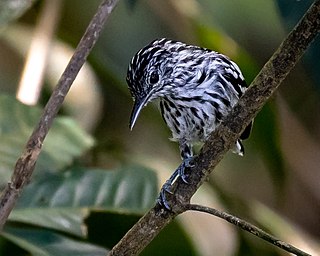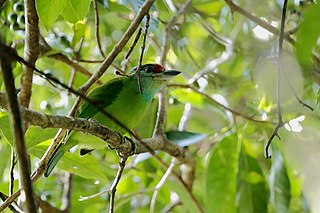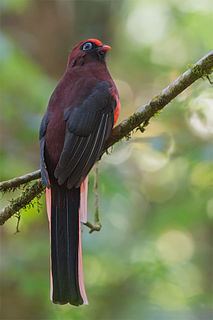 W
WThe belted flycatcher is a species of bird in the family Tyrannidae. It is found in southern Mexico, Guatemala and El Salvador.
 W
WThe Chilean elaenia is a species of bird in the family Tyrannidae, the tyrant flycatchers. It is found from southern Bolivia to Tierra del Fuego. It is sometimes considered a subspecies of the white-crested elaenia.
 W
WKlages's antwren is a species of bird in the family Thamnophilidae. It is endemic to Brazil. It is named after the collector of the first specimen, Samuel M. Klages (1875-1957).
 W
WThe La Selle thrush is a species of bird in the family Turdidae native to Hispaniola. A skulker of broadleaf and pine forests around 1300m, it is limited to a small and declining population in inland Dominican Republic, as well as a relict population in Haiti.
 W
WThe Maracaibo tody-flycatcher, also known as the short-tailed tody-flycatcher, is a species of bird in the family Tyrannidae. It is endemic to arid scrub in the region near Lake Maracaibo in Venezuela. It has formerly been considered a subspecies of the common tody-flycatcher, which it resembles.
 W
WThe Thyolo alethe or Cholo alethe is an endangered species of bird in the family Muscicapidae. It is found in Malawi and Mozambique. It is named after Thyolo, a nearby town in Malawi. Its natural habitat is subtropical or tropical moist montane forests. It is most threatened by habitat loss due to deforestation, fires, and human activities.
 W
WTodd's antwren is a species of bird in the family Thamnophilidae. It is found in the Guiana Shield . Its natural habitat is subtropical or tropical moist lowland forests.
 W
WThe turquoise-throated barbet is an Asian barbet found in Thailand. The barbets get their name from the bristles which fringe their heavy bills; this species eats fruits and insects. It used to be considered a subspecies of the blue-throated barbet.
 W
WWard's trogon is a species of bird in the family Trogonidae. Its range includes the northeastern parts of the Indian subcontinent stretching eastwards to Southeast Asia. It is found in Bhutan, India, Tibet, and Myanmar. It also has a disjunct population in northern Vietnam, but there are no recent records from there. Its natural habitats are temperate forests and subtropical or tropical moist lowland forests. It is threatened by habitat loss.
 W
WThe Zapata rail is a medium-sized, dark-coloured rail, the only member of the monotypic genus Cyanolimnas. It has brown upperparts, greyish-blue underparts, a red-based yellow bill, white undertail coverts, and red eyes and legs. Its short wings render it almost flightless. It is endemic to the wetlands of the Zapata Peninsula in southern Cuba, where its only known nest was found in sawgrass tussocks. Little is known of its diet or reproductive behaviour, and its described calls may belong to a different species.
 W
WThe Zapata sparrow is a medium-sized grey and yellow bird that lives in the grasslands of the Zapata Swamp and elsewhere on the island of Cuba. Measuring about 16.5 centimetres (6.5 in) in length, it is grey and yellow overall with a dark reddish-brown crown and olive-grey upperparts.